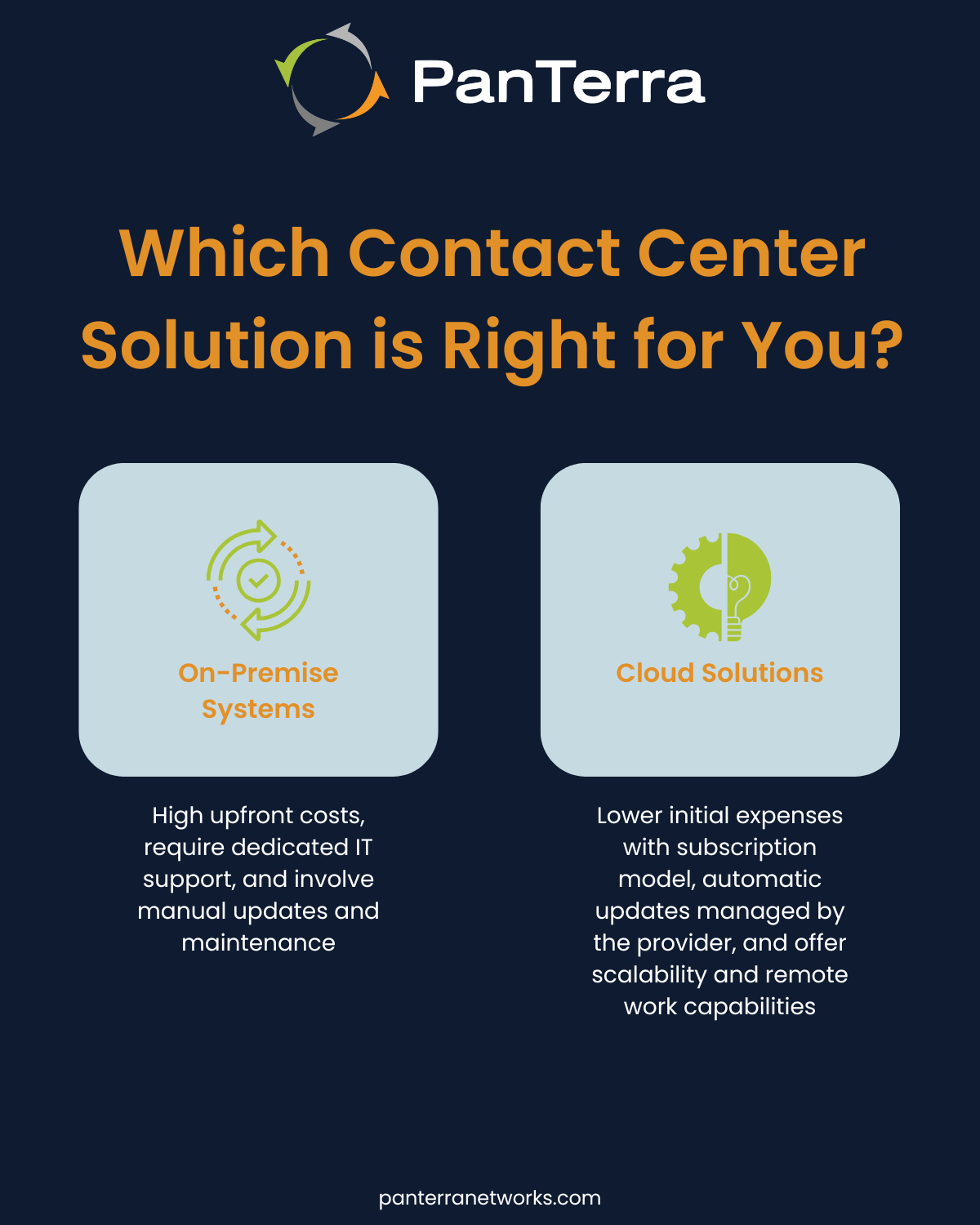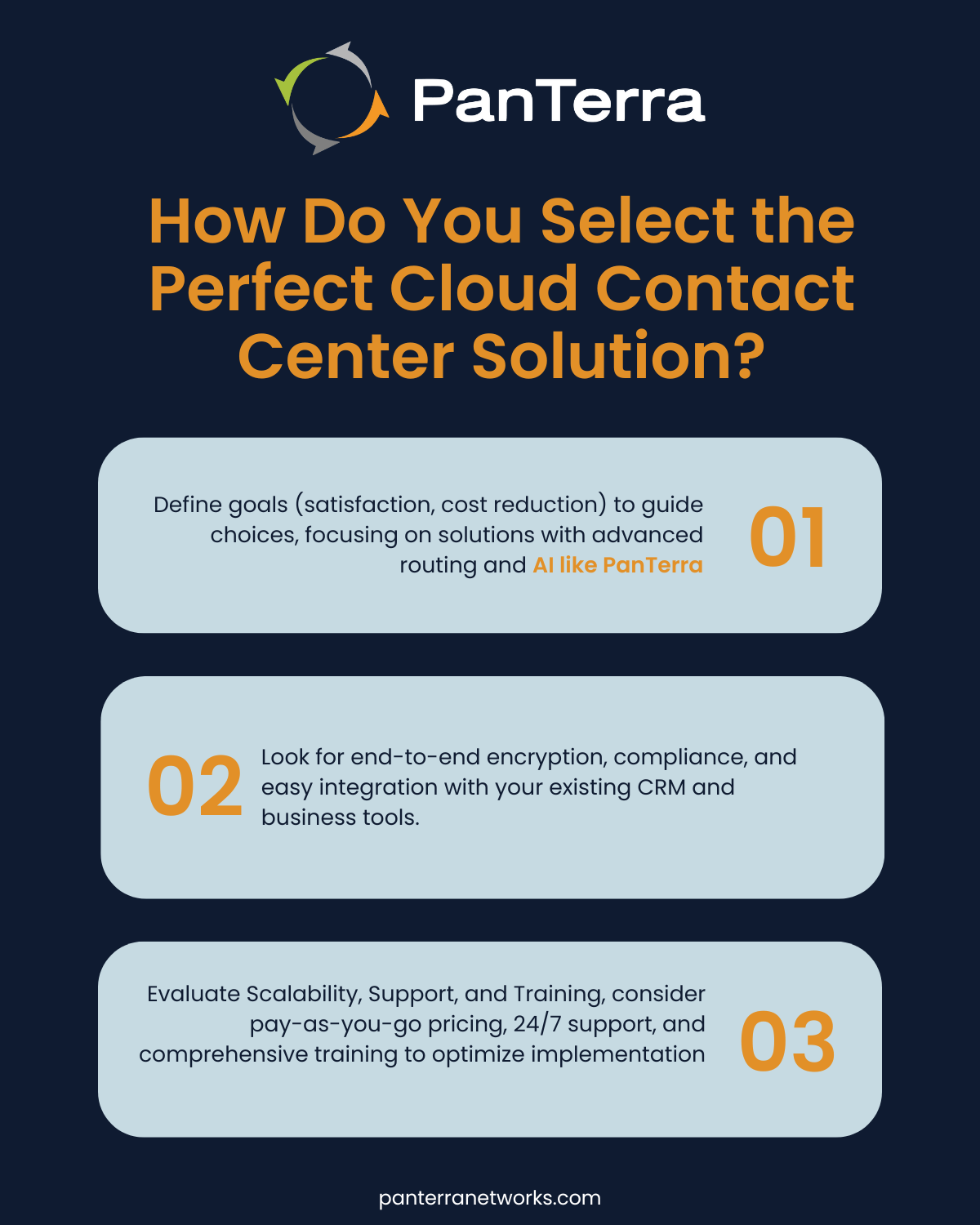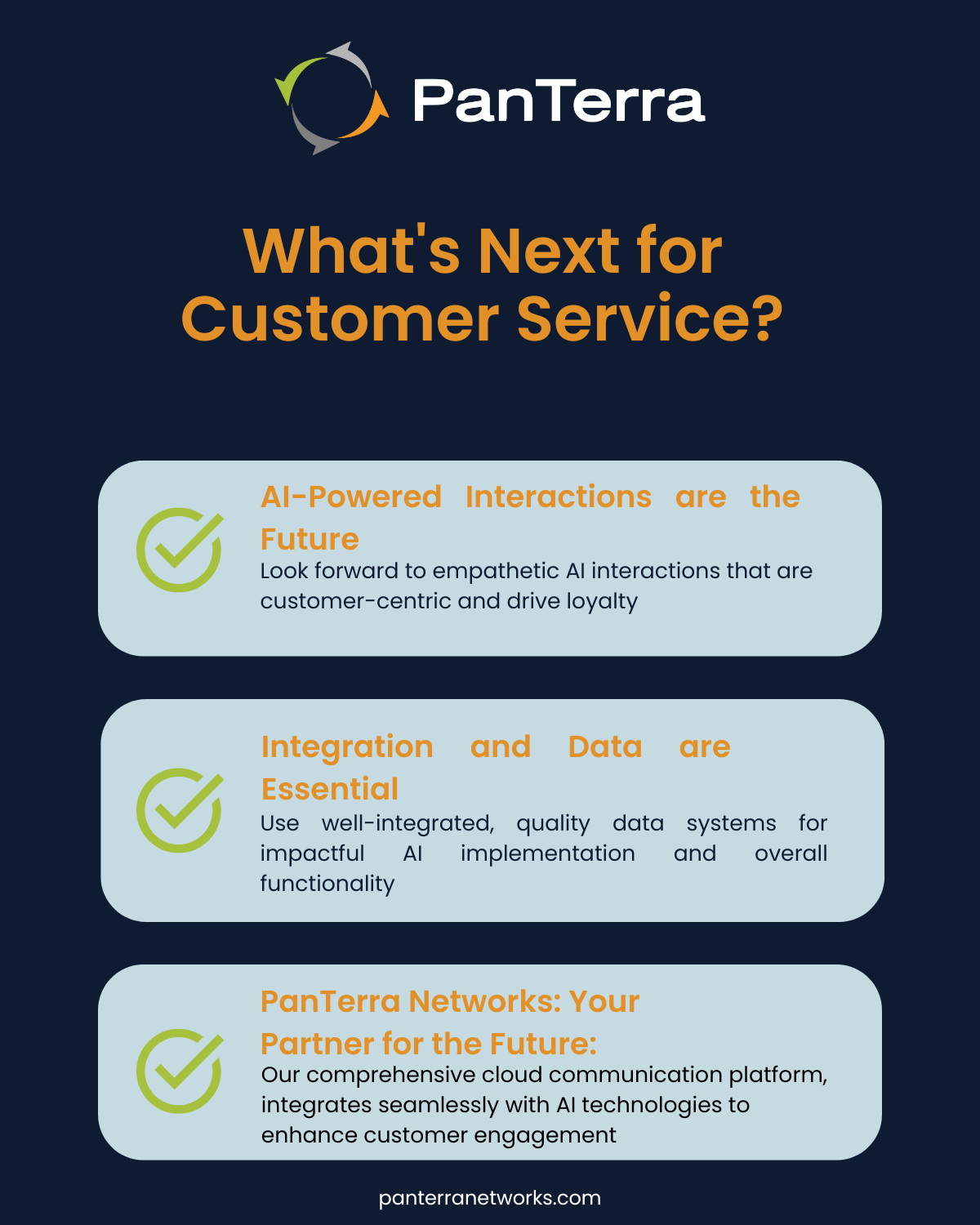Cloud Contact Center Solutions: What You Need to Know
March 17, 2025

Cloud contact center solutions are revolutionizing customer service operations. At PanTerra Networks, we've seen firsthand how these innovative platforms are transforming businesses of all sizes.
This blog post will explore the key features, benefits, and components of contact center cloud solutions. We'll also provide guidance on choosing the right system for your organization and share insights on future trends in cloud-based customer service technology.
What Are Cloud Contact Center Solutions?
The Core of Cloud Contact Centers
Cloud contact center solutions revolutionize customer interactions. These advanced platforms use cloud technology to offer a comprehensive suite of customer service tools, accessible from any location with internet connectivity.

At its core, a cloud contact center solution is a virtual hub for all customer interactions. It combines various communication channels (voice, email, chat, social media) into a single platform. This integration enables businesses to manage customer inquiries efficiently across multiple touchpoints.
Flexibility stands out as a key feature of cloud contact centers. Unlike traditional on-premise systems that require physical hardware and extensive IT support, cloud solutions allow quick scaling based on business needs. This adaptability proves particularly valuable for businesses with seasonal fluctuations in customer service demands.
Cloud vs. On-Premise Systems: A Clear Distinction
The transition from on-premise to cloud-based contact centers marks a significant improvement in operational efficiency. On-premise systems often require substantial upfront investments in hardware and software (not to mention ongoing maintenance costs). Cloud solutions, however, operate on a subscription model, which reduces initial expenses and spreads costs over time.
Maintenance highlights another area where cloud solutions excel. Businesses must handle updates, security patches, and hardware replacements with on-premise systems. Cloud providers automatically manage these tasks, ensuring businesses always access the latest features and security measures.
Benefits for Businesses Across the Board
Cloud contact center solutions create a level playing field, giving small and medium-sized businesses access to enterprise-grade customer service technology. The pay-as-you-go model means businesses only pay for the resources they use, making advanced features more accessible.
For larger enterprises, cloud solutions offer unmatched scalability. They easily accommodate growth or expansion into new markets without significant infrastructure investments. This scalability extends to remote work capabilities (a feature that has become increasingly important in recent years).
Data analytics showcases another area where cloud solutions shine. They provide real-time insights into customer interactions, helping businesses identify trends, improve service quality, and make data-driven decisions. This level of analytics often remained out of reach for smaller businesses using traditional systems.
Choosing the Right Provider
While many cloud contact center providers exist in the market, businesses should carefully evaluate their options. Factors to consider include:
- Integration capabilities with existing systems
- Security and compliance features
- Scalability and pricing models
- Customer support and service level agreements
As we move forward, let's explore the key components that make cloud contact center solutions so powerful and how they can transform your customer service operations.
What Makes Cloud Contact Centers Powerful?
Seamless Omnichannel Communication
Modern cloud contact centers excel in integrating multiple communication channels. This omnichannel approach allows businesses to connect with customers through voice calls, email, chat, social media, and video conferencing. A study by Aberdeen Group reveals that companies with strong omnichannel customer engagement strategies retain 89% of their customers, compared to 33% for companies with weak strategies.

This unified approach to customer communication significantly improves customer satisfaction and loyalty. It provides a consistent experience across all channels, which reduces customer frustration and streamlines support processes.
AI-Powered Customer Interactions
Artificial Intelligence (AI) revolutionizes cloud contact centers, enabling more efficient and personalized customer experiences. AI-powered chatbots and virtual agents handle routine inquiries, allowing human agents to focus on complex issues. These AI tools can help improve self-service, agent productivity, and gain richer operational insights.
These AI tools also provide real-time assistance to human agents, offering suggested responses or relevant information during customer interactions. This improves the speed and accuracy of responses and maintains consistency across all customer touchpoints.
Data-Driven Decision Making
Advanced analytics and reporting tools form the cornerstone of modern cloud contact center solutions. These tools provide businesses with deep insights into their customer service operations, enabling data-driven decision making. Real-time dashboards display key performance indicators (KPIs) such as average handling time, first call resolution rates, and customer satisfaction scores.
A McKinsey report found that companies that extensively use customer analytics are 23 times more likely to outperform their competitors in new customer acquisition and 19 times more likely to achieve above-average profitability.
These analytics help businesses identify trends, pinpoint areas for improvement, and make informed decisions to enhance their customer service strategies. Cloud solutions have democratized access to these powerful tools, previously available only to large enterprises with significant resources.
Efficient Workforce Management
Cloud contact center solutions offer sophisticated tools for forecasting call volumes, scheduling staff, and monitoring performance in real-time. These features allow businesses to optimize their staffing levels, ensuring the right number of agents are available at the right times. This improves customer service by reducing wait times and helps control labor costs by avoiding overstaffing during quiet periods.
Cloud-based workforce management tools also enable greater flexibility for remote work arrangements. A Gartner study predicts that by 2025, 40% of contact center agents will work from home.
As we explore the power of cloud contact centers, it's essential to understand how to choose the right solution for your business. The next section will guide you through the key factors to consider when selecting a cloud contact center provider.
How to Select the Perfect Cloud Contact Center Solution
Align with Your Business Objectives
The selection of a cloud contact center solution must start with a clear definition of your business goals. Do you want to improve customer satisfaction scores, reduce operational costs, or expand your service capabilities? Your objectives will guide your choice. For example, if you aim to reduce response times, you should look for solutions with advanced routing capabilities and AI-powered chatbots.

A Forrester study found that companies which align their technology choices with business goals are 2.5 times more likely to succeed in their digital transformation efforts. This fact underscores the importance of a goal-oriented approach when you select your cloud contact center solution.
Prioritize Security and Compliance
In today's digital landscape, data security is non-negotiable. You must look for providers that offer robust security features such as end-to-end encryption, multi-factor authentication, and regular security audits. If your industry has specific compliance requirements (like HIPAA for healthcare or PCI DSS for financial services), you need to ensure the solution meets these standards.
Cybersecurity Ventures expects global cybercrime costs to grow by 15 percent per year over the next five years, reaching $10.5 trillion USD annually by 2025. This staggering figure highlights the critical need for stringent security measures in your cloud contact center solution.
Ensure Seamless Integration Capabilities
Your cloud contact center should not operate in isolation. It needs to work harmoniously with your existing systems, such as your CRM, helpdesk software, or e-commerce platform. You should look for solutions that offer pre-built integrations with popular business tools or robust APIs for custom integrations.
A study by Aberdeen Group revealed that companies with strong integration capabilities see a 2.2 times improvement in customer satisfaction rates compared to those with poor integration. This statistic underscores the importance of seamless data flow across your business systems.
Consider Scalability and Pricing Models
The right cloud contact center solution should grow with your business. You need to evaluate the scalability options offered by different providers. Can the solution easily accommodate an increase in call volume or the addition of new communication channels?
Pricing models also play a crucial role in your decision. Some providers offer pay-as-you-go models, while others have tiered pricing structures. You should analyze which model aligns best with your budget and expected usage patterns.
Evaluate Customer Support and Training
The level of support and training provided by the solution provider can significantly impact your implementation success. You should inquire about the availability of 24/7 support, the methods of support (phone, email, chat), and the typical response times.
Additionally, comprehensive training resources can help your team quickly adapt to the new system. Look for providers that offer a variety of training options (such as live webinars, on-demand videos, and documentation).
Final Thoughts
Cloud contact center solutions have revolutionized customer service operations, offering unmatched flexibility, scalability, and efficiency. These innovative platforms enable businesses to deliver exceptional customer experiences across multiple channels while optimizing their operations. The future of cloud-based customer service technology promises increased adoption of AI and machine learning capabilities, enhancing personalization and predictive analytics.

Successful implementation of a contact center cloud solution requires clear business objectives and early involvement of key stakeholders. Thorough training for your team will ensure they leverage the full potential of the new system. Regular feedback collection from employees and customers will help identify areas for improvement and drive data-driven decisions.
At PanTerra Networks, we understand the complexities of modern customer service operations. Our cloud communication platform integrates with leading Contact Center as a Service (CCaaS) solutions, providing businesses with a comprehensive toolkit to elevate their customer service capabilities. The future of customer service lies in the cloud, and now is the time to embrace this transformative technology.
.jpg?width=500&height=500&name=Are%20you%20Getting%20a%20Good%20Deal%20(1).jpg)
Comments